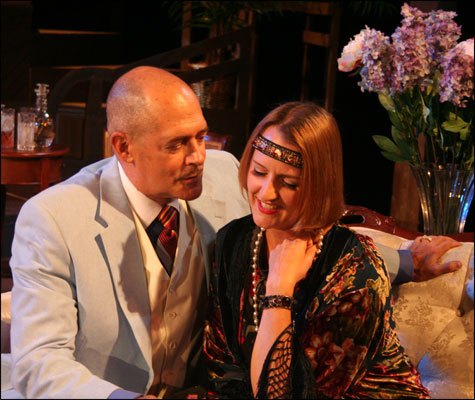
HAY FEVER Ignorance is Bliss — or maybe it’s the other way around — in Noël Coward’s vintage
piffle.
The drawing room moves outdoors at the Publick Theatre, which fields an al fresco staging of Noël Coward’s 1925 comedy of bad manners, Hay Fever (in rep through September 14), that whips the vintage piffle into a paradoxical froth of lightweight histrionics. Coward is said to have written the play in three days, in the wake of a nerve-racking weekend at the country home of American actress Laurette Taylor and her British-playwright husband, J. Hartley Manners, who penned the hoky Peg o’ My Heart for her. If so, Coward was probably not invited back, for the Blisses of Hay Fever are hardly portrayed as heavenly hosts. In less than 24 hours, the self-absorbed and self-dramatizing quartet of actress mom Judith, novelist dad David, adult son Simon, and 19-year-old daughter Sorrel, each of whom has invited a weekend guest without informing the others, manage to drive their company not only out the door but over the edge.

Described by Sorrel, the sole still impressionable Bliss, as “slapdash,” the bickering and eccentric family unit revolves around Judith, who may for the moment have retired from the stage but can no more retire from drama than she can from breathing. Neither can she be weaned from the adulation beamed across the footlights, so she’s asked athletic young blockhead Sandy Tyrell to spend the weekend making eyes at and declarations to her. David has invited a diffident and somewhat dithering flapper, Jackie Coryton, whom he wishes to study “in domestic surroundings” with an eye toward turning her into fiction. Sorrel’s guest is the dapper, much older “diplomatist” Richard Greatham; Simon’s is a sultry Mrs. Robinson of a London socialite called Myra Arundel, whom his mother accuses of using sex “like a shrimping net.” There is, moreover, only one desirable guest room (the second best is referred to as Little Hell), and the meager staff are under the command of Mom’s former dresser, the lackadaisical Clara, who’s generous with neither tea nor sympathy.
The brief weekend evolves over three acts, which director Diego Arciniegas has trimmed to less than two hours including intermissions. So even though the action consists of little more than petulance, posturing, and the plotting of escape, it’s easy to be charmed and hard to be bored as the Blisses conduct their delicate grandstanding, first disregarding, then swapping, then ensnaring their guests in arbitrarily conjured romantic melodramas that culminate in a reprise of Judith’s own Peg o’ My Heart, a cheesy potboiler called Love’s Whirlwind.
At first glance, Hay Fever seems an odd choice for an outdoor staging. True, couples and individuals regularly storm off into the garden (not to mention the library, here apparently located on the front porch). Their al fresco flirtations, however, take place off stage. But one gets used to the open-air parlor, with its odd Russian curlicues left over from the Publick’s other summer offering, The Seagull. And Hay Fever makes an apt bookend to Chekhov’s drama, in which the damage wreaked by a bohemian family is less collateral.
Rafael Jaen provides the looped, layered, and fringed period costumes, which are slinky fun. More important, the acting on view is theatrical without being overdone, beginning with Debera Lund’s not unnatural Judith, whose airs are, well, airy. The rest of the family — Dafydd Rees’s avuncular David, Ross MacDonald’s glib Simon, and Lynn Guerra’s prettily peevish Sorrel — take their cues from her. The comedy derives from the fact that the guests — Robert Serrell’s dense knight of a Sandy, Cheryl Turski’s deliciously self-displaying Myra, Joel Colodner’s starchy yet frisky Richard, and Hannah Wilson’s increasingly bedraggled Jackie — have not been given a script.
If comedy is a machine, then A Flea in Her Ear is a Citroën engine to Hay Fever’s pencil sharpener. French farceur George Feydeau’s best-known work, the classic 1907 door slammer is being revved on the Williamstown Theatre Festival Mainstage (through August 10) in a saucy adaptation by American writer David Ives that greases the gears with some insouciant wordplay. Not that we’re talking Oscar Wilde here: in Tony winner John Rando’s slam-bam, careering-out-of-control staging, the play comes off like a naughty rendezvous with the Three Stooges, the characters behaving desperately while negotiating a roaring tempest of pinch, tickle, race-around, cover-up, and mistaken identity. Under the best of conditions, Feydeau’s intricately calibrated chaos is hard to pull off, and there were some technical problems opening night, among them a turntable with a mind of its own and a door that refused to stay slammed. But that WTF brings off this lavish farce at all with just two weeks’ rehearsal is a testament to skillful thespian dementia and a sadomasochistic physicality that might cause Actors Equity to lobby for combat pay.